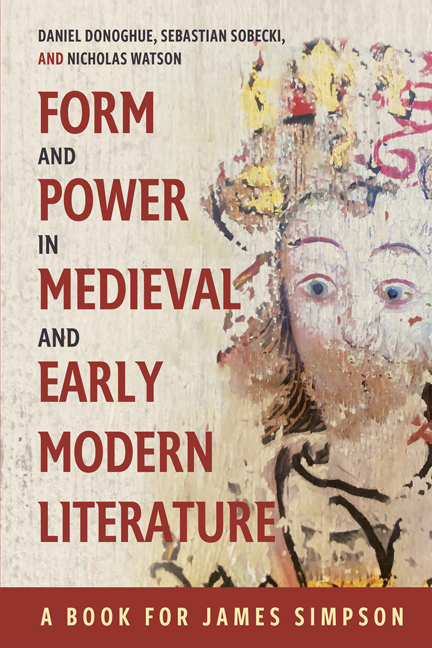Book contents
- Frontmatter
- Contents
- List of Illustrations
- Contributors and Editors
- Acknowledgments
- List of Abbreviations
- Simpson: An Interim Report
- PART I THE HERMENEUTICS OF RECOGNITION
- PART II GENRE AND FIGURE
- PART III CULTURE AND INSTITUTIONS
- PART IV REFORMATIONS
- James Simpson’s Publications from 1984 to 2024
- Bibliography
- A Note on the Bloomfield Conferences
- General Index
- Tabula Gratulatoria
Simpson: An Interim Report
Published online by Cambridge University Press: 17 May 2024
- Frontmatter
- Contents
- List of Illustrations
- Contributors and Editors
- Acknowledgments
- List of Abbreviations
- Simpson: An Interim Report
- PART I THE HERMENEUTICS OF RECOGNITION
- PART II GENRE AND FIGURE
- PART III CULTURE AND INSTITUTIONS
- PART IV REFORMATIONS
- James Simpson’s Publications from 1984 to 2024
- Bibliography
- A Note on the Bloomfield Conferences
- General Index
- Tabula Gratulatoria
Summary
What unites all his work is an attention to the way in which literary texts both illuminate and unsettle discursive patterns in disciplines that might seem more powerful (e.g. theology, economics, psychology, politics).
Simpson on Simpson, 19981This book honors the scholarship and, no less, the teaching of James Simpson, one of the most influential figures in medieval and early modern literary studies over the past half century, and perhaps the single figure who has come to represent the center of the field of late Middle English studies in the form it has taken over most of the past twenty-five years in particular. More specifically, it honors Simpson's signal commitment to the distinctive category of the literary. Over the past four decades, his energetic work has illuminated new intersections between literary and more dominant public discourses, while unsettling received hierarchies of power and disrupting intellectual systems centered on periodization, literalism, and liberalism, especially in relation to what he has taught us to call the Trans-Reformation period. At the heart of these interventions is always the transformative and thus central role of literature as agent and instigator, instrument and subject. Simpson's scholarship tests the boundaries of literary history, exposing tacit cultural structures and passive myths of cultural alterity. His contributions have profoundly shaped scholarship on late medieval literature, from nudging the canon to embrace John Gower, Thomas Hoccleve, and John Lydgate to influencing how an entire generation of students and scholars approaches William Langland's Piers Plowman. Meanwhile, the revisionist bent of Simpson's cultural narratives continues to dislocate the periodizing wedge that has long been driven between the medieval and the proto-modern. In turn, Simpson's hermeneutics of periodization and his polemical probing of the origin myths of modernity (e.g. humanism, liberalism, literalism, iconoclasm, and Protestant triumphalism) have opened up fruitful paths for thinking about literary and intellectual history over the longue durée.
The book grew out of a conference held at Harvard University in the fall of 2022 to mark the occasion of Simpson's retirement from the Donald P. and Katherine B. Loker Professorship of English, which he held for almost twenty years, six of them as Department Chair.
- Type
- Chapter
- Information
- Form and Power in Medieval and Early Modern LiteratureA Book for James Simpson, pp. 1 - 10Publisher: Boydell & BrewerPrint publication year: 2024

